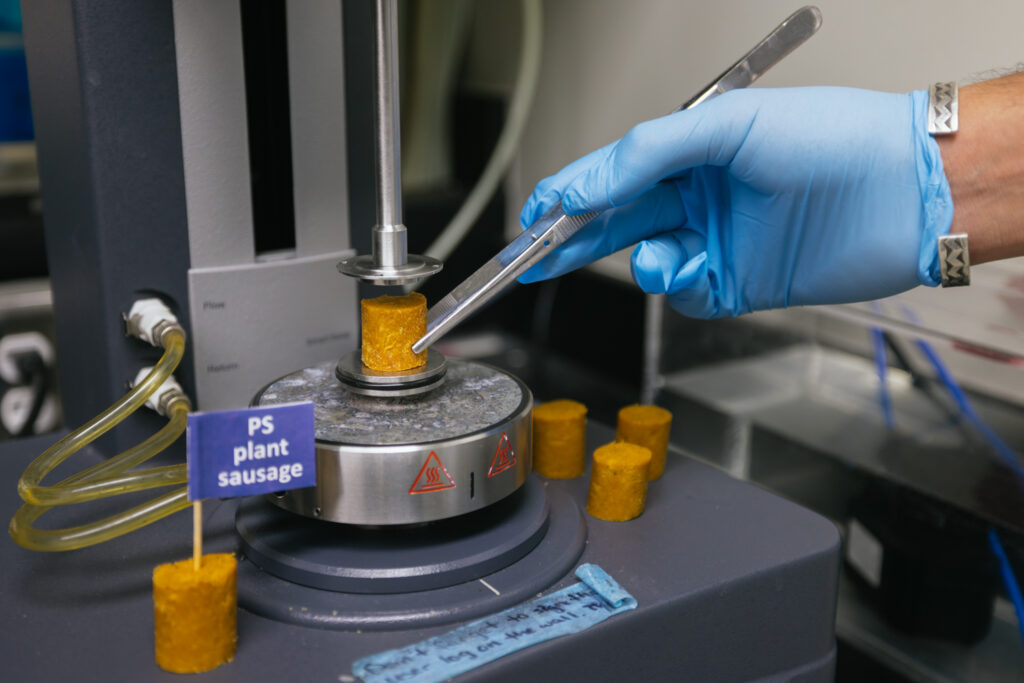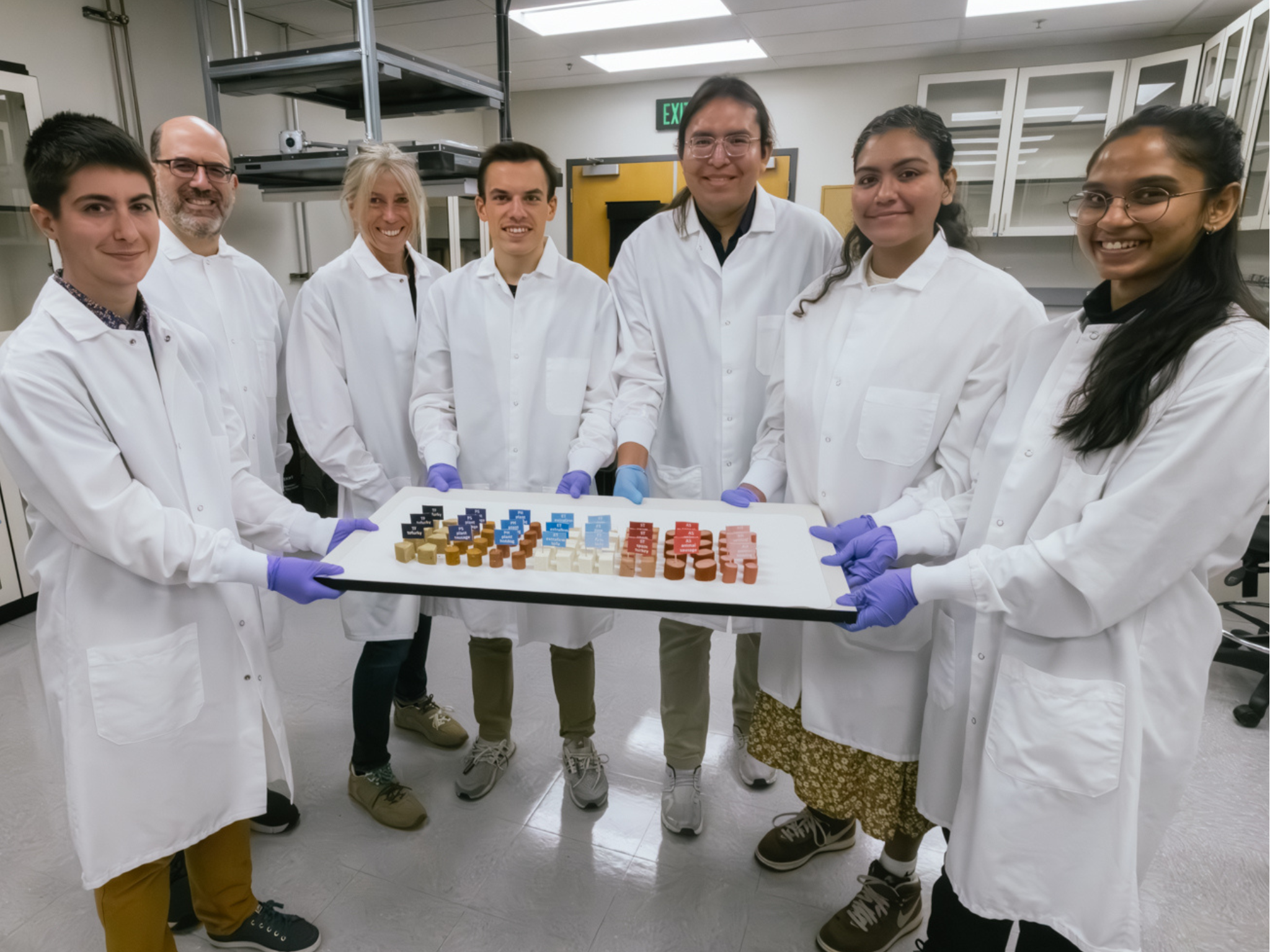5 Mins Read
Scientists at Stanford University suggest that machine learning and mechanical testing can deliver data that can speed up the development of better vegan meat alternatives.
Sandpaper, a brain sectioning knife, and super glue. This assortment of tools might sound random and a little terrifying, but they can actually enable us to better test food products.
In a new study published in the NPJ Science of Food journal, researchers from Stanford University combined these items with 3D-printing techniques and artificial intelligence (AI) to prepare food samples for sensory testing, all in a bid to close the textural gap between animal- and plant-based meat.
The scientists noted that mechanical testing and machine learning can describe food textures with a striking similarity to human taste testers, a finding that could accelerate the development of vegan meat products that more closely resemble their conventional counterparts.
“Instead of using a trial-and-error approach to improve the texture of plant-based meat, we could envision using generative artificial intelligence to scientifically generate recipes for plant-based meat products with precisely desired properties,” the authors wrote.
A three-dimensional test for plant-based meat

“People love meat,” said lead author Skyler St Pierre. “If we want to convince the hardcore meat eaters that alternatives are worth trying, the closer we can mimic animal meat with plant-based products, the more likely people might be open to trying something new.”
His research grew out of a class project where she was looking for affordable materials to use in mechanical tests, turning to hot dogs and tofu. Undergraduate researchers joined in to test the foods and learn how engineers depict material responses to stress, loading and stretching. “These three loading modes represent what you do when you chew,” explained Ellen Kuhl, a senior author of the study.
While food scientists usually characterise meat using a double compression test, which involves only one-dimensional behaviours, the team at Stanford debuted a three-dimensional test comprising tension, compression and shear tests. The aim was to automatically discover the behaviour of eight protein products: vegan and animal-based versions of hot dogs, sausages and turkey, and firm and extra-firm tofu.
The researchers then designed a new type of neural network, which takes raw data from tests and produces equations to explain the properties of meat. To find out whether these equations can depict the perception of texture, they carried out taste tests where participants rated the products on a five-point scale in 12 categories, including softness, chewiness, moisture, fattiness, and likeness to meat.
They found that the vegan hot dog and sausage (from Field Roast) behaved very similarly in the three tests to their conventional counterparts, and showed similar stiffness levels. On the other hand, Tofurky was found to be twice as stiff as turkey, and tofu much softer than the meat products.
“We were surprised to find that today’s plant-based products can reproduce the whole texture spectrum of animal meats,” said Kuhl. “What’s really cool is that the ranking of the people was almost identical to the ranking of the machine. That’s great because now we can use the machine to have a quantitative, very reproducible test.”
AI can help make our food better

St Pierre suggested that while food scientists analyse the texture of plant-based meat to improve upon them, traditional testing methods are not standardised and the results are rarely made available publically, making it harder for scientists to collaborate and create new recipes.
“Historically, some researchers, and especially companies, don’t share their data and that’s a really big barrier to innovation,” he said. Without doing so, “how are we going to come up with a steak mimic together?” he added. That’s why the Stanford team is sharing its data online for researchers to view and contribute to.
The scientists are continuing to build a public database and test foods, including the fungi engineered by Vayu Hill-Maini, who recently joined Stanford as an assistant professor of bioengineering. He was previously at UC Berkeley, where his work proposed the use of koji mould and Neurospora intermedia to produce better meat analogues and turn food waste into gourmet food, respectively.
The Stanford research isn’t the only instance of AI being used to improve plant-based products, although the technology’s carbon footprint needs to be reckoned with. Last year, sustainability non-profit Food System Innovations and machine learning expert Noa Weiss set up the GreenProtein AI project to optimise the extrusion and texture of plant-based meat.
Artisanal vegan cheesemaker Climax Foods also employs machine learning to reverse-engineer what makes cheese taste good, while Chile’s NotCo uses an AI platform to match thousands of plant-based ingredients and find the combinations best suited to replace animal proteins. The technology has helped it create its plant-based dairy and meat products, as well as the hot dogs, cheeses, and mac and cheese products it has co-developed with The Kraft Heinz Company.
These efforts can go a long way in persuading consumers to buy more vegan food. In the US, 42% of people are deterred from trying meat analogues because they feel they’ll dislike their texture, while 22% have cut back their purchases of plant-based food due to their texture. In the UK, too, half of consumers say taste and texture are the biggest factors driving them away from meat alternatives.
Globally, the texture of vegan meat products is as important as their animal-derived versions for 75% of consumers – but only about 60% are actually satisfied with it.
“Our approach to automatically discover the mechanics of plant-based and animal meat with constitutive neural networks could be a starting point towards using generative artificial intelligence to reverse-engineer formulas for plant-based meat products with customer-friendly tunable properties,” read the Stanford study.



